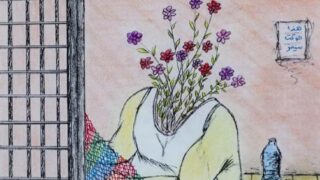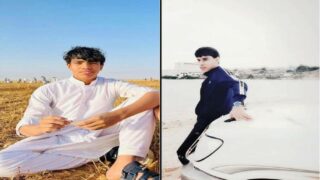According to recent statistics announced by the advisor to the Minister of Education for people with special needs, the number of people diagnosed with autism in Egypt ranges between one and one and a half million.
The suffering of autistic children and their families has been exacerbated during lockdown. Everyone is trying to get past the feelings of fear, isolation, and uselessness with regards to the Covid-19 pandemic and the accompanying measures to combat it. But there is a more severe feeling experienced by a child who suffers from autism, and his family who live a unique experience: isolation, and regression from the path of progress, integration and progress.
Infection… "We either Live or Die Together"
“One question we could not answer: What if Yahya was infected with Corona?” The curiosity of Yahya’s mother, whose son suffers from autism spectrum disorder, raised a feeling of tension, helplessness, and powerlessness in an experienced specialist who has worked in the field of skill development and behavior modification for ten years, and who, with her colleagues who work with children with special needs, receive several calls from parents each day, talking about crying, regressions and setbacks. She says, "We tried to find solutions with parents. We shared many tips and suggestions via Skype and WhatsApp to help them deal with the situation at home, especially since a number of parents have no experience in this regard." As for Yahya’s mother, she was filled with obsessions and fears about the mysterious virus, the isolation and what would happen should they be infected.
In late April, with the frequency of events and the rapid spread of the virus, the results of Omar, a five-year-old autistic child, came back positive after he had contact with his father. The head of the Pediatric Department at Kafr El-Dawwar Hospital, which is designated for quarantine, says in a special statement: "The decision to isolate him from his mother was difficult and stressful for everyone, especially since the mother’s test results were negative. We tried to convince her of the danger of being in quarantine, but she insisted on staying next to him after promising to adhere to all preventive measures. She was wearing medical uniform and was taking the medications which the medical staff takes to prevent her from getting infected."
The doctor, along with the medical team at Kafr El-Dawwar Hospital for Quarantine (including doctors, nurses and administrators) was keen to distribute gifts and toys to the children. He says: “In the beginning, we decided to collect money from each other and buy toys that we disinfect and give to the children. Afterwards, kind people sent many gifts when they learned about the infected children quarantined in the hospital.” Omar left the quarantine with his parents after 18 days of isolation, and his recovery.
According to the doctor, the pandemic exposes children with special needs to a double risk, especially if accompanied by other serious medical conditions such as chronic lung disease or heart disease, as well as their inability to take care of their personal hygiene or practice social distancing.
The Egyptian Ministry of Health and Population did not specify the most appropriate ways to deal with children with autism, nor the methods of prevention in case of being infected or in quarantine so that the competent authorities would be able to implement the appropriate medical measures. However, nearly three months after the initial action taken to confront the crisis, it published brief image instructions on how to deal with the autistic child in light of the emerging crisis of the Corona virus, and how to maintain their mental well-being on its official Facebook page.
Setback… Regression in Skill Development
Studies indicate that many genetic and environmental factors contribute to the emergence of autism spectrum disorders, which disrupts the process of developing social and behavioral skills through a deficiency in early brain development. In general, a child with autism has problems with social interaction and communication skills, unresponsiveness, and poor visual and sensory communication. The forced isolation which the world is experiencing nowadays contributes to the long-term impact on the progress that has been made, and the failure in the developmental, and educational goals that were previously achieved, already with great difficulty.
“There is no cure for autism to date,” this is how the doctor confronted a mother of two twins. She says "we were greatly shocked when we noticed disordered behaviors such as hyperactivity, distraction and inattention. For three years we have been trying to get used to their constant screaming and stubbornness. We stayed away from most of our family and friends and were prevented from going out to public places or special occasions. Controlling them was difficult and exhausting. In the end, doctors said that they have autism spectrum disorder which has no cure and the only available treatment is limited on alleviating the symptoms by increasing their ability to carry out their activities and daily life, while those around me say that there is no hope.”
The mother and her children became “clients” of the early intervention and skills development centers, neurologists, and nutritionists as of late 2011. She says: "Their father was a small employee in the Postal Authority whose monthly salary did not exceed LE 900, while they needed sessions with a monthly cost of up to LE 400; an amount that has been doubled nowadays." She smiles: "I don't know how we got through those days... It is God's protection and grace." After years of regularity and devoting time, effort and money, an improvement appeared on one of them whose case was less severe than his brother. He started responding to instructions, grasping things and being aware of them, responding to the expressions of those around him, getting to know people and developing reading and writing skills little by little, and then joining one of the primary schools in implementation of the law of integration, along with the continuation of the early intervention sessions.
With most of these service provider centers, nurseries and schools entering the third month of the lockdown , this mother and her two children face many educational, behavioral and physical challenges, especially after noticing setbacks and difficulties in reading and writing, attention deficit hyperactivity and their lack of focus skills once again. According to studies, 72% of children with autism have a speech delay, 11% tend to play alone, 9% do not pay attention to the mother, indicating distraction, and 8% lose eye contact.
There are increasing concerns that those who have reached advanced stages in education, health and other skills will lose some of those basic skills which they developed while closely working with teachers and specialists such as behavior modification, speech and skill development. In this vein, director of the Early Intervention Center in Beheira Governorate indicated in special statements: “Children with autism, in normal times and circumstances, need to receive rehabilitation programs such as physical, sensory, motor, and speech therapy, among others on an ongoing basis. They also need to receive educational programs in specialized rehabilitation centers at the hands of specialists. In light of the Corona pandemic, the accompanying home quarantine, and the complete closure of all institutions and centers, they have been deprived of their necessary needs and basic rights that provide them with the ability to go on and overcome the difficulties to integrate into society.
A specialist in occupational therapy and sensory integration has confirmed the necessity of their presence in places prepared for treatment and development of various skills. She mentioned, for example, the fully-equipped sensory integration rooms that specialize in treating sensory processing disorder, where children are placed in a specially designed room to stimulate and excite all the senses, as an important step on the road to treatment. During the session, the therapist works closely with the child to reach a level of sensory stimulation which enables the child to explore his senses more intensely; something unavailable at home.
The Dilemma… Remote Education
Due to this emerging reality, the idea of "remote education" came about through the available technologies and media such as the Internet, educational programs and learning platforms through the Egyptian Knowledge Bank where a number of private and official institutions completed their curricula after the suspension of various educational institutions.
In the living room, a middle school social studies teacher sat at his computer, warning his children not to make noises in the next room so that he can complete his ‘online’ lesson. He dealt with Adam, who is partially recovering from autism, in a different way. He recorded the video of the lesson, placing his face completely in front of the mobile screen, so that Adam could read his lips. The integration of Adam into the educational stages led to a noticeable improvement in his condition, despite his hearing impairment and speech difficulties, but he was adept at lip reading.
There is also an increasing concern that those who have reached advanced stages in education, health, among other fields, will lose some of the basic skills they developed while working closely with teachers and professionals, such as behavior modification, speech and skill development.
The integration process is based on identifying and evaluating special educational needs and developing the methods used. Moreover, early interventions during the pre-school stage contribute to autistic people learning social skills, in addition to acquiring various behavioral and functional skills. However, the different characteristics of the autism spectrum from one child to another contribute to varying degrees of interaction and benefiting from the teaching and learning programmes.
According to the consultant of psychiatric and neurological diseases and addiction treatment, remote education is a challenge for families with students with special needs in general, due to the difficulty of controlling their movement and stability. He added: “Autistic people need special standards and methods for visual, auditory and kinesthetic learning. He pointed to a number of measures that differ according to the special needs of the child, but they all work to reduce the stress and depression that may affect the ordinary children and those with special needs who heavily rely on a team of teachers and specialists in more than one area. He also explained that the child may need weekly day care in the morning, as well as double sessions for speaking, developing skills or modifying behavior. Adding: “It is unrealistic to expect parents to fill these specialized roles.” He urges parents to talk to their children about COVID-19 and help them understand the pandemic by using the children's programs that are mainly prepared to tackle this aspect, in addition to the instructional cartoons and pictures, allowing them to express their difficult feelings such as frustration, anger, anxiety and fear. Parents should also, wherever possible, establish a routine for their children.
Blue Army… Initiatives and Appeals
On the second of April of every year, the world turns blue, declaring solidarity with people with autism on their international day. The Corona crisis has produced a blue army similar to the White Army of specialists, professionals and initiatives. They published videos, clips and instructions on social media for those dealing with children with special needs in general, and autism in particular, to guide and train parents. The most important of which was “Always your Support” campaign launched by the Egyptian Autistic Society which is concerned with designing a daily routine for children that mimics the routines followed by school, day care, or the routine provided by the usual caregiver.
The Sphinx and the Great Pyramid in Blue in Solidarity with People with Autism
The National Council for Women issued a guidebook on dealing with people with disabilities as regards raising their awareness and the means of dealing with possible cases of infection. The Council placed this guidebook at the disposal of the concerned authorities for distribution among those responsible for implementing the official awareness campaigns, in addition to all the medical teams concerned with providing medical services to the virus-infected people in all Egyptian hospitals. This guidebook provides the most appropriate means to deal with each disability with regards the methods of prevention and in case of quarantine.
Furthermore, an international expert in the field of disability called for the inclusion of a main column in the data of the daily counts of the Ministry of Health to register whether the infected person has any form of disability, in order to take the most appropriate preventive measures and precautions in quarantine.
In normal times and circumstances, autistic children need to receive rehabilitation programs such as physical, sensory, motor, and speech therapy on an ongoing basis, as well as educational programs in specialized rehabilitation centers at the hands of specialists. Yet in light of the Coronavirus and the accompanying home quarantine, in addition to the complete closure of all institutions and centers, such children were deprived of this necessary care.




